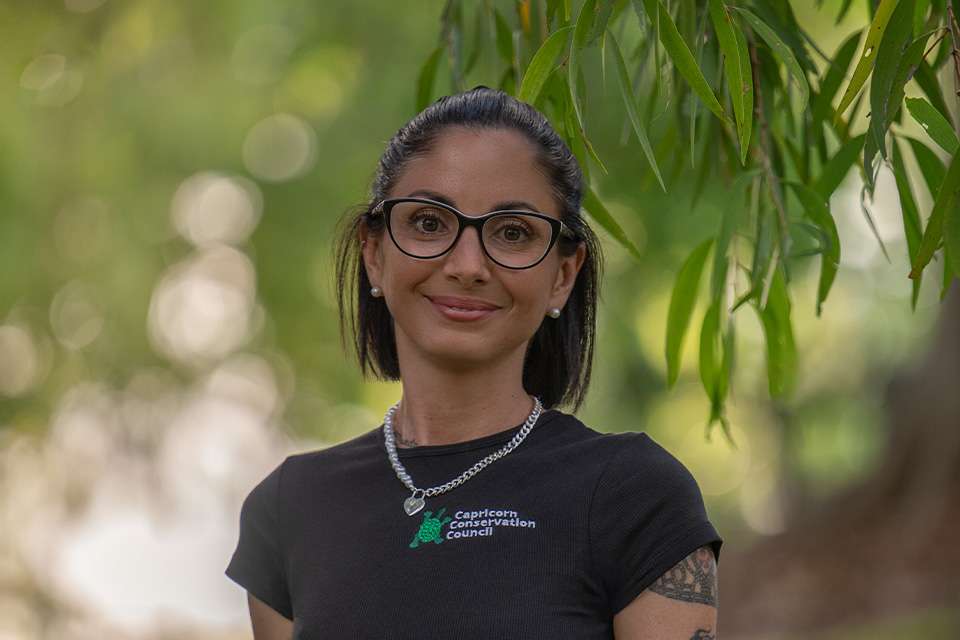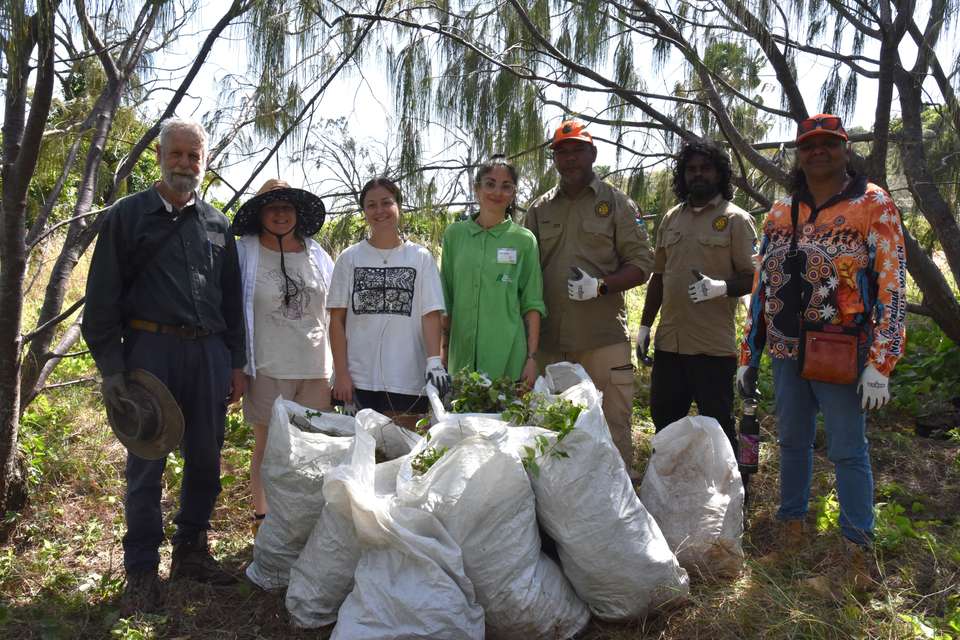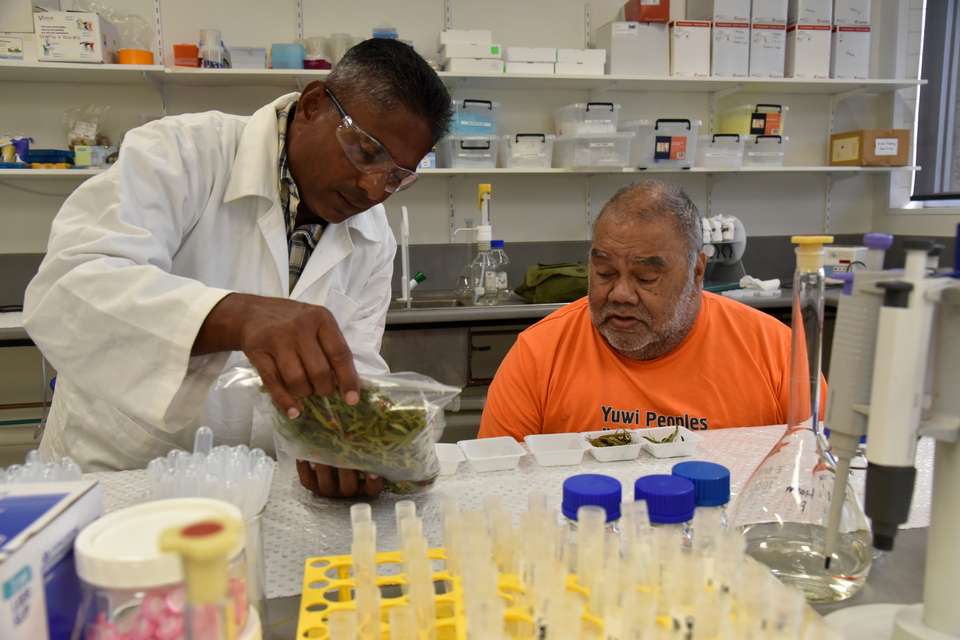Study underscores importance of Indigenous ownership in First Nations research

New research has shown that the elevation of First Nations ownership and leadership in Indigenous research is the bedrock for ethical, equitable outcomes for Aboriginal and Torres Strait Islander communities.
Presented by CQUniversity Environmental Science academic Sophie George, the recently published research paper entitled, Exploring Indigenous-led research through a reflexive pathway, presents a holistic body of work that advocates for empowerment of knowledge-sharing, community wellbeing and cultural self-determination, along with a model for best practice in future research.
A passionate advocate for Indigenous-led knowledge systems, Ms George is also the Capricorn Coast Conservation Council Coordinator, a role through which she has been able to create actionable change by elevating Indigenous knowledge through boots-on-the-ground conservation work in partnership with Traditional Owner groups, including Woppaburra and Darumbal Elders.
It is through both her academic research and hands-on biodiversity work in direct collaboration with Indigenous communities that Ms George has seen the profound impact that Indigenous-led research has in not only transforming Western medicine, but ultimately in seeing the continued improvement in health outcomes for Aboriginal and Torres Strait Islander peoples.
“We have seen that Indigenous-led research is gaining visibility and demonstrating transformative potential,” Ms George said.
“It strengthens Indigenous knowledge systems and redefines the relationship between Indigenous peoples and Western science, but ultimately, it upholds the sovereignty, wellbeing and aspirations of Aboriginal and Torres Strait Islander communities – both now and for future generations.
“This is especially important when we’re looking at ways of supporting the survival, self-determination and protection of language, culture and identity.”

Guided by internationally recognised standards from the United Nations’ declaration on the rights of Indigenous peoples, Ms George was determined to work alongside Ghungalu and Yuwi Elders Uncle Steve and Murrie Kemp, whose insights demonstrated the significance of integrating traditional practices alongside Western science.
“Working directly with Traditional Owners in research areas that will directly impact their communities ensures future research is culturally appropriate, community-driven and sustainable,” Ms George said.
“We looked at it as integrating a ‘decolonial approach’ for future research models, to ensure Indigenous peoples take ownership of research that affects them, and by doing so we’ll see the direct correlation translating further to the promotion of Indigenous economic self-determination and cultural resilience.”
Drawing from knowledge passed down from his father with a view to see this knowledge retained for future generations, Ghungalu Elder Uncle Steve Kemp was inspired to establish Yarbun Creations in 2022 – a 100 per cent Aboriginal owned and family operated health and wellness company – which was also integral in informing the research.
“I have been waiting a long time for this opportunity to research my father’s and ancestors’ knowledge of bush medicine/tucker,” Uncle Steve said.
“This process not only validates the healing and health benefits of bush medicine/tucker but will also provide a process for other First Nations people.”

The importance of establishing foundational research on ancestral lands has also been highlighted in this partnership, demonstrating not only a commitment to collaboration and respect but also a greater retention of ancestral knowledge.
“I have been living on my traditional land which includes Woorabinda for 34 years and during this time I was doing my own research with my father Tim Kemp and other relations,” Uncle Steve said.
“A lot of knowledge of bush medicine/tucker has been lost, but there are still some First Nations people who have retained this knowledge.
“My father, Elders and ancestors were professors of the bush and used their eyes, taste, smell and feel, plus the environment as their research tools.”
Underpinned by ethical foundations of informed consent and permission from communities, and reciprocal relationships that are centred on community-focused research outcomes, Ms George said that continued support and investment was crucial to sustain Indigenous-led research to ensure that long-term outcomes could be achieved.
“We’re committed to addressing systemic barriers and to develop frameworks to ensure that healthcare services are respectful, inclusive and responsive to the cultural needs of Aboriginal and Torres Strait Islander peoples – and so translating knowledge into an accessible and culturally relevant form is essential for meaningful engagement.”
Exploring Indigenous-led research through a reflexive pathway was recently published in Issue One of the Australian Institute of Aboriginal and Torres Strait Islander Studies Journal, and was co-authored alongside Sophie George by Ghungalu Elder Uncle Steve Kemp, Ghungalu and Yuwi Elder Murrie Kemp, CQUniversity Environmental Geographer Michael Hewson, CQUniversity Cell Biologist Holly Hosking, CQUniversity Chemical Scientist Janice Mani, CQUniversity Clinical Scientist Ryan du Preez, and CQUniversity Natural Products Chemist Mani Naiker. Research was also informed in collaboration with Yarbun Creations.
To learn more about the profound health benefits and research into traditional medicine:
READ: Science backs traditional medicine with native Gumbi Gumbi discoveries
WATCH: Support vital research into traditional medicine
Keep up to date with Yarbun Creations via their Facebook page.
